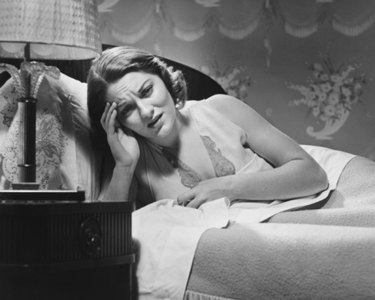
A rapid heart rate, also known as tachycardia or heart palpitation, is the sensation that your heart is beating more forcefully, irregularly or faster than usual. In many cases, when you experience this feeling at night, it is simply because you are more aware of it at rest than when you are busy during the day. However, a rapid heart rate can be a symptom of certain health conditions, or a side effect of your diet and certain medications.
About Increased Heart Rate
Video of the Day
According to MedlinePlus, palpitations that give you the sense your heart is beating faster than normal may be discomfiting, but are usually not serious. Many of the common causes, such as those outlined below, are not life threatening and are often easily treatable. However, they can be a sign of heart complications, so if your symptoms persist and you also experience chest pain and shortness of breath, you should contact a doctor immediately for an accurate diagnosis.
Video of the Day
Panic Attacks
Panic attacks occur when your body has an exaggerated response to stress, fear or excitement. To prepare itself for the perceived danger, your body produces more adrenaline, which results in symptoms including an increased heart rate, rapid breathing and/or difficulty breathing, chest pains and sweating. Panic attacks can occur at night and, just as you are aware of needing to go to the toilet when you are asleep, you are likely to register bodily changes associated with an attack, such as increased heart rate.
Menopause
One of the most common symptoms for women in menopause is hot flashes, which can be accompanied by changes in heart rate. Hot flushes commonly occur at night and are referred to as night sweats. But no matter when you experience them, the symptoms include feeling hot and becoming red in the face, neck and chest, sweating, heart palpitations and difficulty sleeping.
Stimulants
Some of the most common causes of increased heart rate -- whether awake or asleep -- are caffeine, energy drinks, alcohol and some medications, such as those found in some asthma inhalers and cold and flu drugs that contain pseudoephedrine, says the CNN Health website. All of these substances are classed as stimulants, which cause your heart rate to increase. Check with your doctor before stopping any prescribed medication.